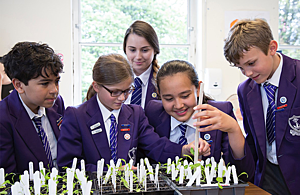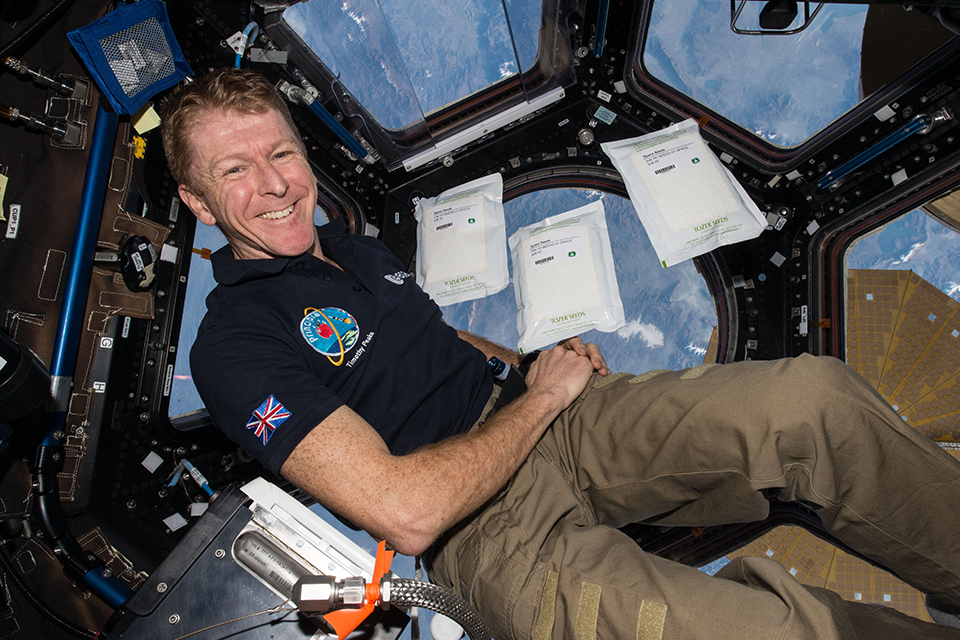Salad could one day be grown on Mars
Salad seeds sent to space on the International Space Station (ISS) grow only slightly slower when back on Earth, giving hope for the future of growing food on another planet.

Schoolchildren taking part in Rocket Science experiment. Credit: RHS
The findings come after 2kg of rocket seeds spent six months on board the ISS with British European Space Agency (ESA) astronaut, Tim Peake, as part of his Principia mission. Here they would absorb up to 100 times more radiation than on Earth and be subject to intense vibrations from the stresses and strains of space travel.
When the seeds returned to Earth in 2016, 600,000 children from schools and groups across the UK took part in an experiment, supported by the UK Space Agency, to plant them and monitor their growth, comparing it to that of seeds that had remained on Earth.
The results show that, while the space seeds grew more slowly and were more sensitive to ageing, they were still viable. It suggests that, by taking sensible steps to protect the seeds on their journey, it should be possible to grow plants in space or on another planet for humans to eat.
British ESA astronaut Tim Peake said:
In one of the largest and most inspirational experiments of its kind, more than half a million young people collected reliable data to help the scientists at Royal Holloway investigate the effects of spaceflight on rocket seeds.
When humans travel to Mars, they will need to find ways to feed themselves, and this research helps us understand some of the biology of seed storage and germination which will be vital for future space missions.

Professor Gerhard Leubner and Dr Jake Chandler, both from the Department of Biological Sciences at Royal Holloway, led the research, along with Professor Alistair Griffiths from the RHS, which has been published in the journal Life.
Dr Jake Chandler, from Royal Holloway, said:
Transporting high quality seeds to space and beyond will be crucial for growing plants that support human exploration of space, Mars and other worlds.
Our study found that a six-month journey to space reduced the vigour of rocket seeds compared to those that stayed on Earth, indicating that spaceflight accelerated the ageing process.
Thus, while we should carefully consider protecting seeds from potentially harmful factors including space radiation and mechanical vibration, the seeds remained alive, and the prospect of eating home-grown salad on Mars may be one small step closer.
The Royal Horticultural Society (RHS) tasked 8,600 schools and groups across the UK to take part in the controlled study, documenting their results as a scientist would. It was part of a project called Rocket Science, led by the RHS Campaign for School Gardening, in partnership with the UK Space Agency.
Alana Cama, Schools and Groups Manager at the RHS, added:
The Rocket Science experiment opened a window into space biology and allowed young people to be at the forefront of innovative research.
This research project did more than just inspire; it furthered our understanding of the challenges around growing plants in unusual environments and the feasibility of growing food on long term space missions in the future. Inspiring a new generation of botanists and biologists will remain a highlight of our mission to enrich everyone’s lives through plants.
Humanity’s drive and ambition to explore will rely upon thousands of research projects, just like this. The RHS looks forward to supporting and nurturing the talent of our young people in more exciting citizen science projects in the future.
Other partners who worked on the research include University of Marburg and Science and Advice for Scottish Agriculture (SASA) and Tozer Seeds.
Join Tim Peake, Dr Jake Chandler and Alana Cama on Monday, 18 May 2020 at 11.30am for a live stream and Q&A. Tune in to find out about life in space as an astronaut and the science behind the project.